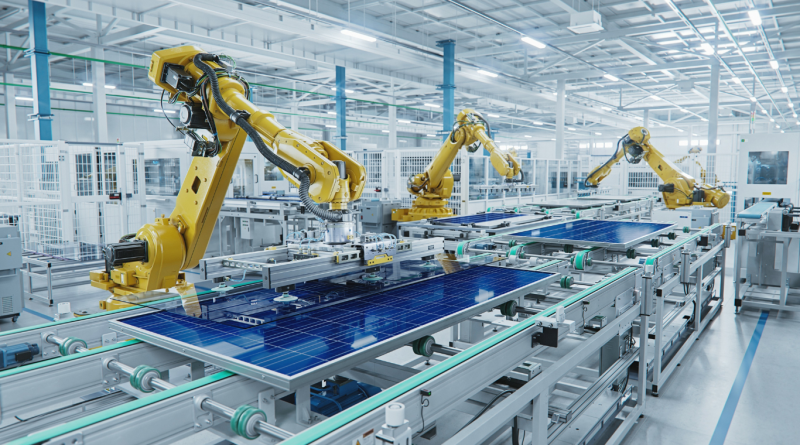Top 10 Advanced Manufacturing Companies Revolutionizing Industries
Advanced manufacturing has emerged as the cornerstone of industrial transformation, blending cutting-edge technology with traditional production methods. At its core, advanced manufacturing integrates automation, data analytics, and innovative materials to redefine how products are designed and made. The adoption of advanced manufacturing technology not only improves efficiency but also drives sustainability, positioning industries for a more resilient future.
Here’s a look at 10 companies leading the charge in advanced manufacturing.
1. General Electric (GE)
Why GE Stands Out:
GE has revolutionized industrial manufacturing with its adoption of technologies like additive manufacturing (3D printing) and digital twins. The company integrates artificial intelligence to optimize production cycles and predict system failures before they occur.
Key Contributions:
- Pioneered the use of 3D-printed parts for aviation engines, reducing waste and cost.
- Digital twin technology creates virtual replicas of physical assets, enabling real-time monitoring and predictive maintenance.
GE’s approach showcases how digital and physical systems can seamlessly interact to enhance manufacturing outcomes.
2. Siemens
Why Siemens Stands Out:
Siemens has been a trailblazer in Industry 4.0, bridging the gap between automation and digitalization. Their advanced solutions improve productivity across various sectors, from energy to transportation.
Key Contributions:
- The MindSphere IoT platform facilitates data collection and analysis, driving informed decision-making.
- Advanced robotics streamline factory processes while maintaining safety standards.
Siemens exemplifies how advanced manufacturing technology can foster innovation and sustainability.
3. Tesla
Why Tesla Stands Out:
Known for revolutionizing the automotive industry, Tesla integrates cutting-edge automation and robotics in its manufacturing plants. Its Gigafactories are renowned for high-tech assembly lines powered by AI.
Key Contributions:
- AI-driven systems improve precision and reduce production errors.
- Utilization of renewable energy in Gigafactories reflects Tesla’s commitment to sustainability.
Tesla’s advanced manufacturing processes continue to redefine electric vehicle production globally.
4. Boeing
Why Boeing Stands Out:
In aerospace, Boeing leverages additive manufacturing to create lightweight, high-performance components. This reduces fuel consumption and carbon footprints for its aircraft.
Key Contributions:
- Additive manufacturing innovations allow for rapid prototyping and customized designs.
- Focus on composite materials increases efficiency and reduces costs.
Boeing’s strategies demonstrate how advanced manufacturing can align with sustainability goals.
5. Toyota
Why Toyota Stands Out:
Toyota has long been a pioneer in lean manufacturing, but its embrace of advanced robotics and automation further cements its leadership in manufacturing innovation.
Key Contributions:
- Automated Guided Vehicles (AGVs) enhance flexibility in production lines.
- Collaborative robots (cobots) work alongside humans to boost productivity.
Toyota’s smart manufacturing processes offer a perfect blend of efficiency and innovation.
6. Honeywell
Why Honeywell Stands Out:
Honeywell integrates IoT and advanced sensor technologies into manufacturing, providing solutions that optimize processes and reduce downtime.
Key Contributions:
- Smart sensors collect real-time data to ensure precision in operations.
- Focus on energy-efficient systems aligns with green manufacturing trends.
Honeywell’s emphasis on optimization positions it as a leader in smart manufacturing technologies.
7. IBM
Why IBM Stands Out:
IBM’s contributions to advanced manufacturing technology lie in its AI-powered solutions, which enable predictive maintenance and improved supply chain management.
Key Contributions:
- AI-driven systems predict and address equipment malfunctions.
- Cloud-based analytics platforms optimize production workflows.
IBM’s technology underscores the importance of data-driven approaches in modern manufacturing.
8. ABB Robotics
Why ABB Robotics Stands Out:
ABB Robotics leads the industrial robotics market, offering solutions that transform manufacturing processes. Their robotic systems are integral to industries like automotive, healthcare, and electronics.
Key Contributions:
- Precision robotics enhance productivity and minimize waste.
- Versatile systems adapt to various manufacturing environments.
ABB Robotics’ advancements demonstrate the future potential of automation in manufacturing.
9. Lockheed Martin
Why Lockheed Martin Stands Out:
As a leader in defense and aerospace, Lockheed Martin uses cutting-edge technology to create sophisticated manufacturing systems.
Key Contributions:
- Incorporates AI and simulation tools to enhance accuracy.
- Focus on sustainable manufacturing aligns with environmental goals.
Lockheed Martin’s innovations are critical in advancing high-performance manufacturing systems.
10. Fanuc Corporation
Why Fanuc Stands Out:
Fanuc is a global leader in robotic automation and CNC (Computer Numerical Control) systems. Their technology drives efficiency across industries.
Key Contributions:
- CNC systems improve accuracy in machining and assembly.
- Robotic arms offer unparalleled precision and speed.
Fanuc’s automation solutions are instrumental in transforming manufacturing operations.
These companies exemplify the transformative power of advanced manufacturing technology. From robotics to AI and IoT, they are reshaping industries, enhancing efficiency, and driving sustainability. As advanced manufacturing evolves, these leaders continue to pave the way for a more innovative and productive future.
